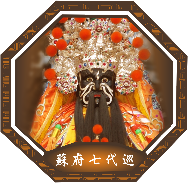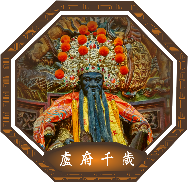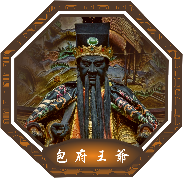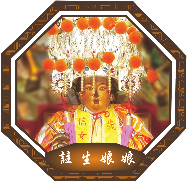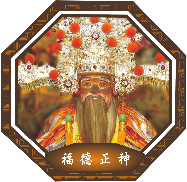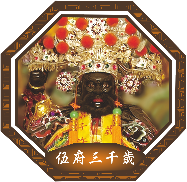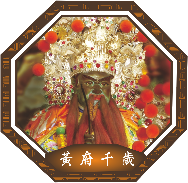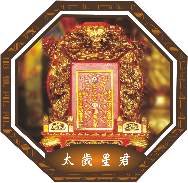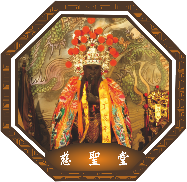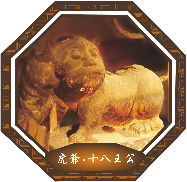|
Taisui Star Lords
A Taisui (the Great Age-Star, or Jupiter) must be seated and appeased when a person’s age shares or breaks (a difference of 6 years) the Taisui. In earlier days, Taisui was usually seated in the residence. But due to inconveniences at home, most our Beneficent Providers have begun to seat their Taisui in our Temple. In addition to wider and more comforting spaces, protective watch by Temple Deities, and Mantra Recitals for the prevention of disasters on the 1st and 15th days of the first month creates a more formal atmosphere for appeasing the Taisui.
Jhen Hai Kung will invite a Taoist Master to preside over the Ceremony to Honor and Appease the Taisui Lord every New Year. The Ceremony is formal and we welcome all sincere adherents and beneficent providers to join us for the Rites.
Service Hotline: (08)8327777, Service Time: 8:00 AM to 5:00 PM
|
|
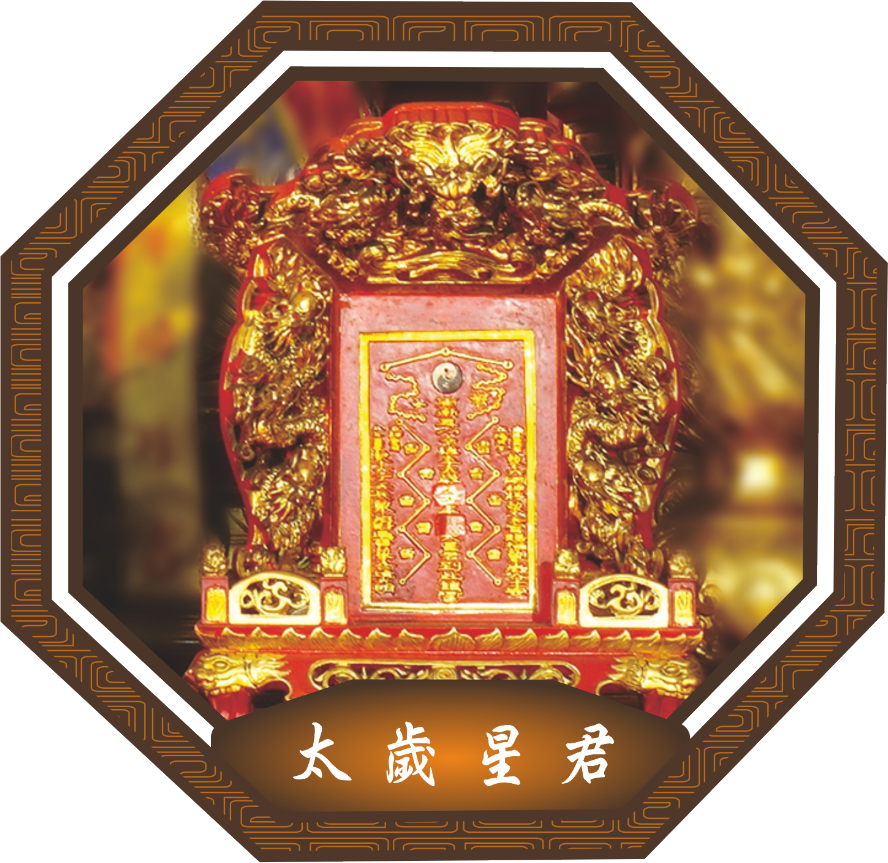
During the last year of the Shang dynasty, Jiang Ziya was tasked by the Heavens to deify the various gods at the Ascension Altar at Xiqi City. Yin Jiao, the son of the Shang Tyrant King Zhou, was given the title “Grand Marshal and General of Wuguang and Qisha of the Taisui” and preside over the Taisui (Great-Age Star) whose orbit was sixty Jiazi years. Both sharing and breaking of Taisui mentioned in common beliefs relied on the 12 year cycle of the Great-Age Star (Jupiter has an orbital period of 11.86 years). Those who share the Taisui are people who are born with the same Earthly Branch (or Chinese Zodiac Year). A person born in the Year of the Rooster would share the Taisui with another person born in the Year of the Rooster. People who break the Taisui are those birth years differ by six Earthly Branches (6 years at the least). For example a person born in the Year of the Rooster would have his/her Taisui broken by a person born in the Year of the Hare.
The Yellow Emperor’s Calendar circulating amongst the common folk would usually print the name of the Taisui in the first page. Additionally, a Talisman would be also included in the inner pages for summoning the Taisui Lord for Peace in the Household. Birth years (or age) of people who must seat and appease the Taisui for that given year would also be listed, usually on the back page, front page or the inner page of the Talisman. The ages for those who share the Taisui will be 1, 13, 25, 37, 49, 61, 73, 85 and 97 years old (nominal age). And those who breaks the Taisui, which are those “whose Taisui Breaking Spirit would be at the opposite of the Taisui Lord and are likely to face calamities in the form of theft, robbery or financial loss” are those with the ages of 7, 19, 31, 43, 55, 67, 79 and 91 years old. Whether one is sharing or breaking the Taisui, this is a grave matter with misfortunes that can only be overturned by seating and appeasing the Taisui. Additionally, there are also left and right deviated breakings. Left deviated breakers of Taisui would be at 4, 16, 28, 40, 52, 64, 76, 88 and 100 years of age, while right deviated breakers would be at 10, 22, 34, 46, 58, 70, 82, and 94 years of age. These people must also seat and appease the Taisui to prevent misfortune according to the sayings of traveling priests.
So what exactly is the Taisui? Strictly speaking, Sui (or Age) refers to a Star and a Deity of the Year. Numerologists of ancient China made use of Jupiter, whose orbital period was about 12 (11.86) years, as the Age-Star. The orbital period of the Age-Star was divided into 12 equally sized portions (approximately a year), with Names designating each of the 12 locations of the Star. Each Age-Star is also governed by a Deity or Taisui. Given that there are also 12 Earthly Branches, hence there will be an equal valued Earth Branch with each Taisui. In the branch year of Chou (Year of the Ox), a Taisui of the same year would be active, giving each Taisui an active period every 12 years. The 12 Taisui Lords were also regarded as bearers of misfortune. For every year, the direction of the Taisui Lord would be designated as an inauspicious one, where digging, constructing and moving should not be carried out. Some numerologists believe that Taisui Lords are Warrior Gods of Year Lord. In the years of Yin (Tiger), Mao (Rabbit) and Chen (Dragon), the Taisui stands guard at the east. In the years of Si (Snake), Wu (Horse) and Wei (Ram), the Taisui stands guard at the South. In the years of Shen (Monkey), You (Rooster) and Xu (Hound) the Taisui stands guard at the West. And in the years of Hai (Boar), Zi (Rat) and Chou (Ox), the Taisui stands guard at the North. When people wishes to construct buildings or move their houses, they must avoid the direction where the Taisui stands guard to prevent “moving Earth on Taisui’s head” and subsequent calamities. And opposite the position of the Taisui stands the Lord Posui (Star-breaker) who invites financial ruin and theft. Hence, people will avoid that position as well.
Each year has a different reigning Taisui, the names are given beow:
In the year of Xin- Si (18th, the sign of Snake, 2001), the Taisui is named Zheng Zu.
In the year of Ren-Wu (19th, the sign of Horse, 2002), the Taisui is named Lu Ming.
In the year of Gui-Wei (20th, the sign of Ram, 2003), the Taisui is named Wei Ren.
In the year of Jia-Shen (21st, the sign of Monkey, 2004), the Taisui is named Fang Gong.
In the year of Yi-You (22nd, the sign of Rooster, 2005), the Taisui is named Jiang Zhuan.
In the year of Bing-Xu (23rd, the sign of Hound, 2006), the Taisui is named Xiang Ban.
In the year of Ding-Hai (24th, the sign of Boar, 2007), the Taisui is named Feng Qi.
In the year of Wu-Zi (25th, the sign of Rat, 2008), the Taisui is named Ying Ban.
In the year of Ji-Chou (26th, the sign of Ox, 2009), the Taisui is named Pan You.
In the year of Geng-Yin (27th, the sign of Tiger, 2010), the Taisui is named Wu Huan.
In the year of Xin-Mao (28th, the sign of Rabbit, 2011), the Taisui is named Fan Ning.
In the year of Ren-Chen (29th, the sign of Dragon, 2012), the Taisui is named Peng Tai.
In the year of Gui-Si (30th, the sign of Snake, 2013), the Taisui is named Xu Shun.
In the year of Jia-Wu (31st, the sign of Horse, 2014), the Taisui is named Zhang Ci.
In the year of Yi-Wei (32nd, the sign of Ram, 2015), the Taisui is named Yang Xian.
In the year of Bing-Shen (33rd, the sign of Monkey, 2016), the Taisui named Guan Zhong.
In the year of Ding-You (34th, the sign of Rooster, 2017), the Taisui is named Kang Jie.
In the year of Wu-Xu (35th, the sign of Hound, 2018), the Taisui is named Jiang Wu.
In the year of Ji-Hai (36th, the sign of Boar, 2019), the Taisui is named Xie Shou.
In the year of Geng-Zi (37th, the sign of Rat, 2020), the Taisui is named Yu Qi.
In the year of Xin-Chou (38th, the sign of Ox, 2021), the Taisui is named Tang Xin.
In the year of Ren-Shen (39th, the sign of Tiger, 2022), the Taisui is named He E.
In the year of Gui-Mao (40th, the sign of Rabbit, 2023), the Taisui is named Pi Shi.
In the year of Jia-Chen (41st, the sign of Dragon, 2024), the Taisui is named Li Cheng.
In the year of Yi-Si (42nd, the sign of Snake, 2025), the Taisui is named Wu Sui.
In the year of Bing-Wu (43rd, the sign of Horse, 2026), the Taisui is named Wen Zhe.
In the year of Ding-Wei (44th, the sign of Ram, 2027), the Taisui is named Lu Bing.
In the year of Wu-Shen (45h, the sign of Monkey, 2028), the Taisui is named Yu Zhi.
In the year of Ji-You (46th, the sign of Rooster, 2029), the Taisui is named Cheng Yin.
In the year of Geng-Xu (47th, the sign of Hound, 2030), the Taisui is named Hua Qiu.
In the year of Xin-Hai (48th, the sign of Boar, 2031), the Taisui is named Ye Jian.
In the year of Ren Zi (49th, the sign of Rat, 2032), the Taisui is named Qiu De.
In the year of Gui-Chou (50th, the sign of Ox, 2033), the Taisui is named Lin Pu.
In the year of Jia-Yin (51st, the sign of Tiger, 2034), the Taisui is named Zhang Chao.
In the year of Yi-Mao (52nd, the sign of Rabbit, 2035), the Taisui is named Fang Qing.
In the year of Bing-Chen (53rd, the sign of Dragon, 2036), the Taisui is named Xin Ya.
In the year of Ding-Si (54th, the sign of Snake, 2037), the Taisui is named Yi Yan.
In the year of Wu-Wu (51st, the sign of Horse, 2038), the Taisui is named Yao Li.
In the year of Ji-Wei (52nd, the sign of Ram, 2039), the Taisui is named Pu Yue.
In the year of Geng-Shen (53rd, the sign of Monkey, 2040), the Taisui is named Mao Zi.
In the year of Xin-You (54th, the sign of Rooster, 2041), the Taisui is named Wen Zheng.
In the year of Ren-Xu (55th, the sign of Hound, 2042), the Taisui is named Hong Ji.
In the year of Gui-Hai (56th, the sign of Boar, 2043), the Taisui is named Yu Cheng.




